A pleasantly warm and wet spell in central Mongolia eight centuries ago may have propelled the rise of Genghis Khan, according to a U.S. study Monday.
The research was based on an analysis of tree rings spanning 11 centuries, showing that the conqueror seized power during dry times and was able to expand his empire across Asia during an unusual stretch of good weather.
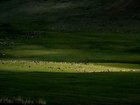 Full Story
Full Story
African elephants can differentiate between human languages and move away from those considered a threat, a skill they have honed to survive in the wild, researchers said.
The study suggests elephants, already known to be intelligent creatures, are even more sophisticated than previously believed when it comes to understanding human dangers.
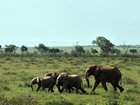 Full Story
Full Story
The steam and heat from volcanoes allowed species of plants and animals to survive past ice ages, a study showed Tuesday, offering help for scientists dealing with climate change.
An international team of researchers said their analysis helped explain a long-running mystery about how some species thrived in areas covered by glaciers, with volcanoes acting as an oasis of life during long cold periods.
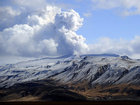 Full Story
Full Story
Two Russian cosmonauts and an American astronaut on Tuesday landed back on Earth in Kazakhstan after a stay of more than half a year aboard the International Space Station.
Russians Oleg Kotov and Sergei Ryazansky and NASA astronaut Mike Hopkins touched down in their Soyuz capsule at 0324 GMT outside Dzhezkazgan in Kazakhstan, mission control said.
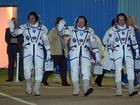 Full Story
Full Story
Worried scientists said Sunday they had found four new ozone-destroying gases in the atmosphere, most likely put there by humans in the last 50-odd years despite a ban on these dangerous compounds.
It is the first time since the 1990s that new substances damaging to Earth's stratospheric shield have been found, and others may be out there, they said.
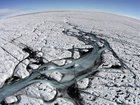 Full Story
Full Story
Astronaut Koichi Wakata has become the first Japanese commander of the International Space Station, according to the country's space agency.
In a simple ceremony onboard the station, Wakata took over the facility's command from Russian predecessor Oleg Kotov, the Japan Aerospace Exploration Agency said late Sunday.
 Full Story
Full Story
The European Union is making steady progress towards its 2020 renewable energy target, a key effort in curbing the greenhouse gas emissions blamed for global warming, official data showed Monday.
Renewables -- predominantly wind but including tidal and biomass sources as well -- accounted for 14.1 percent of the EU's energy consumption in 2012, up from 13 percent in 2011, the Eurostat statistics bureau said.
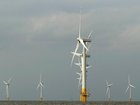 Full Story
Full Story
Australia has endured another "angry summer" with more than 150 temperature records smashed, a new report said Monday, with a warning that heatwaves and sweltering conditions will only get worse.
Among the records broken, Perth had its hottest night ever at 29.7 Celsius (85.4 Fahrenheit), Adelaide recorded its warmest February day (44.7 Celsius) while Sydney went through its driest summer in 27 years, the independent Climate Council watchdog said.
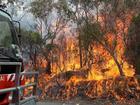 Full Story
Full Story
U.S. Secretary of State John Kerry has called on American ambassadors around the world to make the fight against climate change a top priority ahead of new U.N. talks next year.
In his first department-wide policy guidance statement since taking office a year ago, he told his 70,000 staff: "The environment has been one of the central causes of my life."
 Full Story
Full Story
Astronomer Carl Sagan become Mr. Science for a generation after his 1980 series, "Cosmos," took audiences on a groundbreaking TV journey through the universe.
Astrophysicist Neil deGrasse Tyson, host of "Cosmos: A Spacetime Odyssey," the 21st-century edition debuting Sunday, has a head start with a Twitter following of 1.7 million that's just edged by the starry likes of Gwyneth Paltrow and Cee Lo Green.
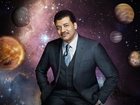 Full Story
Full Story



